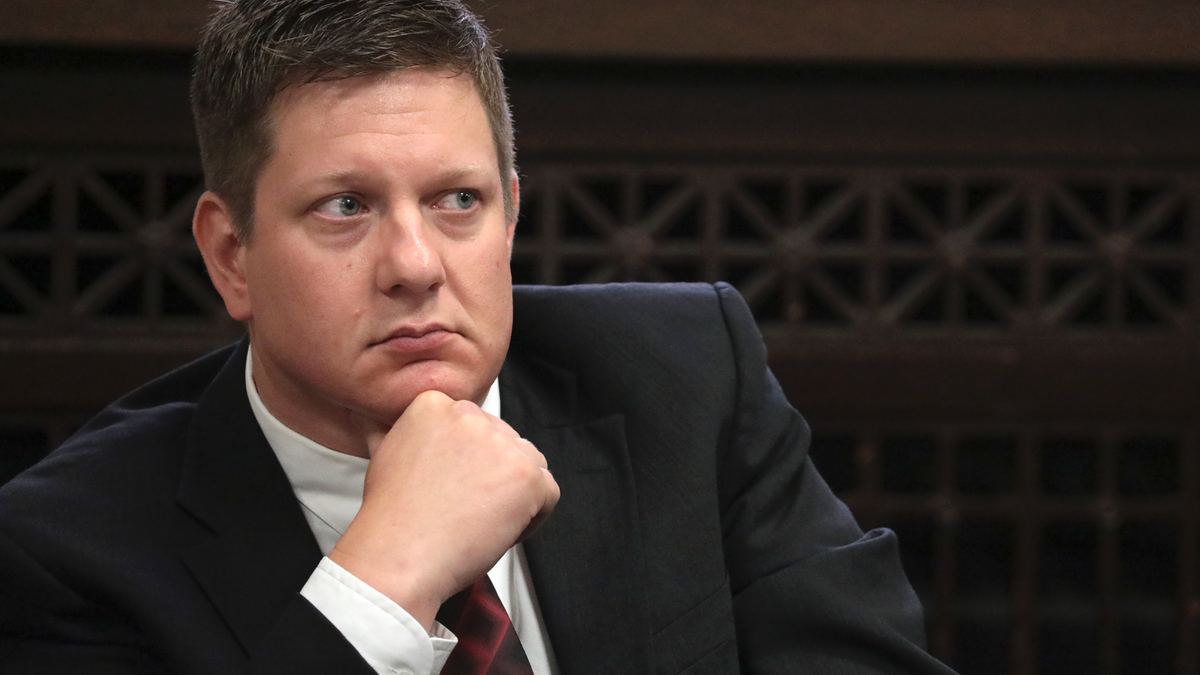
FILE - In this Thursday, Sept. 6, 2018, file photo, Chicago police Officer Jason Van Dyke, charged with murder in the shooting of black teenager Laquan McDonald in 2014, listens during a hearing at the Leighton Criminal Court Building in Chicago. Attorneys are expected to start questioning possible jurors in Van Dyke's trial on Monday, Sept. 10, 2018. (Antonio Perez/Chicago Tribune via AP, Pool, File)
CHICAGO – Jury selection began Monday in the murder trial of a white Chicago police officer who shot a black teenager, Laquan McDonald, 16 times. If the pace of proceedings on the first day was any indication, it could be a while before testimony begins.
By late afternoon, attorneys representing Officer Jason Van Dyke and prosecutors agreed on five people to sit on the jury so far. Three are women: a Hispanic mother of three young children who said she could be fair and respects police officers, a white woman who works as a record keeper and said she wanted to see evidence before forming an opinion, and a white woman who said she saw the video of the shooting but hadn't made up her mind.
Two men were selected: an Asian-American financial analyst who said on his questionnaire that everyone including police officers must abide by the law, and a white man who is gay and said he didn't know much about the case.
Prosecutors and attorneys for Officer Jason Van Dyke agreed on two jurors, a white woman who said she worked as a record keeper and wanted to see evidence before forming an opinion and a Hispanic mother of three young children who said she could be fair and respects police officers.
"I think they just do their job," the Hispanic woman told the court.
Others, though, acknowledged that it would be difficult to be fair and impartial because of what they know about the 2014 shooting. The release of dashcam footage of Van Dyke repeatedly shooting McDonald that the police department and Mayor Rahm Emanuel fought to keep private sparked widespread outrage and led to large protests and the firing of Chicago's police superintendent.
And with attorneys and Judge Vincent Gaughan raising the possibility that the judge might sequester jurors during a trial that will last weeks, it also seems likely that the truck driver who told the judge that sitting on a jury would hurt his ability to make a living won't be the last would-be jurors to be dismissed for hardship reasons.
The question that most dominated Monday morning's proceedings was the one about fairness. One woman, for example, said she thought that after the shooting, there was a "cover-up and attempt to protect the police department and the mayor."
Though she didn't elaborate, Van Dyke wasn't charged with first-degree murder until the day the video was released, which was more than a year after the shooting. Since then, other officers at the scene have been charged with lying on their reports in what prosecutors say was an effort to cover up what happened to protect Van Dyke.
"With any other case I would say yes," she said, when asked if she could put her feeling aside and be fair to Van Dyke. "With this case, I'd have to say no."
A bartender who was dismissed for hardship reasons after explaining that he only gets paid when he shows up for work said he thought firing 16 times was "excessive." Another man, when asked if he could set aside what he knows about the case and be impartial, looked directly at Van Dyke, and simply said, "No."
Van Dyke's lead attorney, Dan Herbert, also suggested that jurors will be under intense public pressure. He asked one prospective juror about a possible reaction in her neighborhood if she voted to acquit Van Dyke, to which Gaughan quickly told Herbert to "knock it off." But the question does point to how stressful it might be to sit on a jury in a case that has elicited intense feelings in Chicago and across the nation.
To protect the jurors during the proceedings, which were being watched by a small group of reporters, the names, exact ages and hometowns of potential jurors weren't disclosed. And the judge warned attorneys that if they mention the name of a prospective juror, they could be fined or even jailed.
The tenor of Monday's proceedings also signaled that the trial will be contentious. When, for example, Herbert tried to bring up his pending motion to move the trial out of Chicago, the judge angrily told him to stop or he was going to hold him in contempt for "obstructing the administration of justice." When Herbert protested, saying he was only trying to get his comments "on the record," the judge angrily warned him, "You keep talking and you're going to have a record."









































